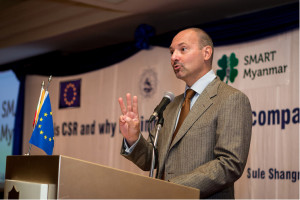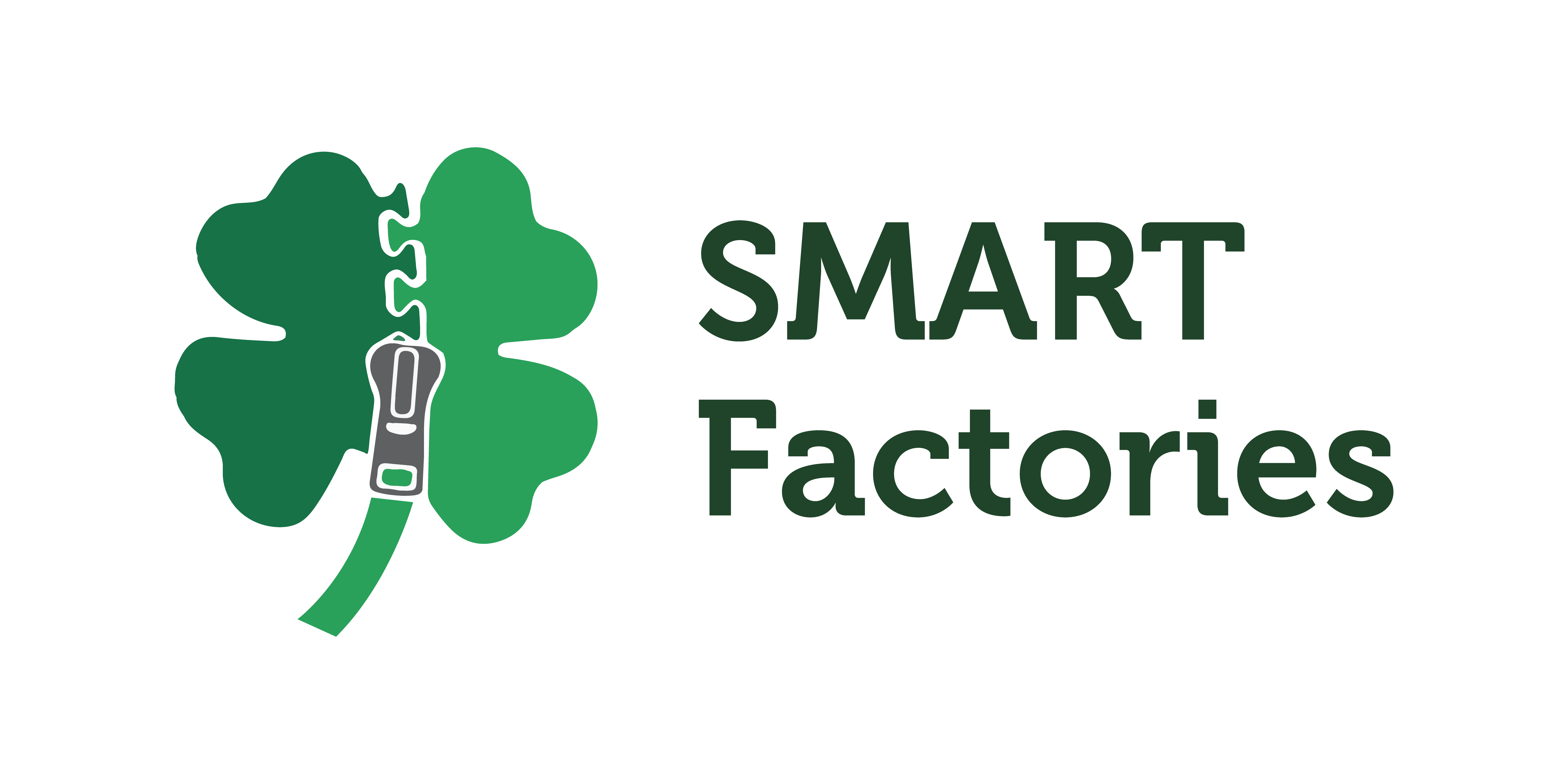Participatory approach produced realistic and contextually relevant document by Jacob Clere
 SMART Myanmar first discussed a garment industry “code of conduct” with The Myanmar Garment Manufacturers Association (MGMA) in early 2013. At that time, a couple things became quite clear after initial discussions: 1) The MGMA wanted to write its own “Code of Conduct” informed by local knowledge and context and 2) Knowledge on internationally accepted social compliance and responsible business practices was severely lacking in Myanmar’s garment sector.
SMART Myanmar first discussed a garment industry “code of conduct” with The Myanmar Garment Manufacturers Association (MGMA) in early 2013. At that time, a couple things became quite clear after initial discussions: 1) The MGMA wanted to write its own “Code of Conduct” informed by local knowledge and context and 2) Knowledge on internationally accepted social compliance and responsible business practices was severely lacking in Myanmar’s garment sector.
Thus, a journey towards improved social compliance practices in the Myanmar garment industry was started. As it happened, SMART Myanmar was not acting alone. MGMA had already been promoting improved management techniques via their training institute. As well, CBI from the Netherlands, the ILO and several other initiatives also started providing seminars and workshops focused around improving working conditions and management practices in Myanmar’s garment factories.
In November 2013, SMART Myanmar and the MGMA organized a “Code of Conduct” workshop with Ms. Juliane Schroeder, an expert from one of SMART’s implementing partners, the Confederation of the German Textile and Fashion Industry t+m. This was a full day participatory tow day workshop at which the MGMA Code of Conduct was discussed in great detail. For several factory owners present at this workshop, knowledge on international practices related to child labour, fire safety and overtime was previously almost entirely unknown. Ms. Schroeder introduced the ILO’s core conventions and the United Nation’s Guiding Principles on Business and Human Rights. Importantly, a subcommittee of the MGMA Executive Board was established at the end of this workshop and tasked with primary responsibility for writing the MGMA Code, with support for this endeavour freely available from SMART Myanmar.
In 2014, progress on the Code stalled. A half-finished draft was considered again and again, but the most sensitive issues like working hours per week and young workers kept being discussed, and really became stumbling blocks towards implementation.
The issue of child labour continued to be heavily discussed. The condition which MGMA arrived at was to limit young workers to beginning work at 15 years of age. MGMA strongly supports child labour remediation for young workers and supports efforts to improve the availability of free education for children and teenagers in Myanmar. As such, factories adhering to the MGMA Code of Conduct are embracing ILO Convention 138 recomending 15 as the minimum age for young workers.
Progress on finalizing the MGMA Code of Conduct picked up again following SMART Myanmar’s social compliance workshops in 2014. In 2013 and early 2014, SMART had been working more heavily on factory productivity improvements and energy efficiency to set preconditions to offer assistance on areas related to social compliance. SMART launched a CSR program together with Systain, a CSR consultancy company in September 2014 which was extremely well-received by participants. This followed on SMART’s CSR public event in October, 2014, at which the EU Ambassador and several local companies and CSR experts discussed responsible business practices in Myanmar’s manufacturing sector.
Indeed, there was a real hunger by local garment factory owners and managers to improve safety and working standards in their factories. Before SMART’s programs, such businesses did not have the knowledge and resources necessary to make the requisite improvements, but after working with and learning from SMART’s experts, factory owners in Myanmar began to realize that they are, in fact, capable of running successful businesses wherein responsible business practices actually facilitate and encourage new orders by opening them up to the EU market.
As such, by November 2014, MGMA’s Executive Board reached a position where they felt confident enough in their knowledge of social compliance and responsible garment manufacturing that they organized a session to finalize their draft Code of Conduct and produce a document suitable for ratification.
The MGMA Code of Conduct Subcomittee was re-convened in December 2014 by Mr. Jacob Clere, SMART Myanmar’s SCP Project Manager based at the MGMA. Ms. Schroeder, from t+m returned to assist in the final drafting because t+m, being an association themselves, have developed their own Code of Conduct as well. Also present were Ms. Simone Lehmann, SMART Myanmar Project Director from sequa gGmbH and Mr. Paul Tinsley, Business Partnerships Manager from Sheffield Chamber of Commerce in the UK (one of SMART’s other implementation partners). These several individuals from SMART Myanmar gathered with MGMA Chairman, Mr. Myint Soe and the other members of the MGMA Code of Conduct Subcommittee at the national chamber of commerce building to go through the draft Code of Conduct line-by-line to offer advice on changes, finalization and ratification.
Following this meeting, the wider MGMA Executive Board gathered for one final private meeting to discuss and ratify this first ever “Code of Conduct” for Myanmar’s apparel industy. Although intended as a guide and instrument for MGMA’s member companies, the Code is also relevant and useful for other industries and manufacturers in Myanmar. Several other associations have started to inquire about the MGMA CoC already.
The MGMA Code of Conduct was introduced to the public starting on February 1st, 2015 as a voluntary document to guide corporate behavior and inform on best practices.
The way forward
SMART Myanmar is presently working with the MGMA on activities and workshops to implement the standards outlined in the Code. Throughout 2015, MGMA has the free support of SMART Myanmar’s industrial engineering team to assist their factory members on relevant issues.
On the basis of the SMART Compliance Academy, the MGMA Executive Board and wider membership plan further steps to make the whole industry comply with the Myanmar Garment Manufacturers Association's Code of Conduct. The companies indicated the need for sharing knowledge concerning CSR and requested monthly on-site monitoring of the changes initiated by the SMART compliance academy in order to keep the momentum for change up and running. Corrective action plans regarding factory improvements were welcomed by the compliance academy participants. In order to ensure sustainability of CSR knowledge, board members of the MGMA decided to hire an additional full time staff-member to create a CSR desk.
It was pointed out by MGMA's Chairman Myint Soe that the CSR issue is crucial not only because buyers want to see compliance fitting with international standards, especially European buyers, but also because better working conditions encourage factory workers to be more motivated and satisfied in their jobs, which itself results in improved factory productivity. The Code of Conduct therefore has been translated into Burmese and bi-lingual posters will soon be available for display in all factories. A two way communication concerning the Code shall be set up, both to buyers and manufacturers. Furthermore, a round table discussion about the MGMA Code of Conduct and social compliance standards is presently being organized by the EU Delegation, SMART and MGMA. During this dialogue, to be held 25 March 2015, the EU Delegation to Myanmar will foster dialogue between the ILO, government ministries, the MGMA, trade union confederations and international brands to increase compliance with the MGMA Code of Conduct.
Photo caption
Roland Kobia, EU Ambassador to Myanmar discusses at SMART Myanmar’s October 2014 CSR Forum how responsible business practices are essential for manufacturers wishing to export to the European Union.
Source: SMART Myanmar








